A list of books
A list of some of the books I recently read. I read much more, but found these worth a comment:
 |
“Novacene” (2019) [Allen Lane / Penguin] |
| James Lovelock | |
Interesting, enthusiastic account of Lovelock's Gaia concept followed by speculation on the emergence of non-biological AI life. I have some questions:
Lovelock agrees with me on these points: reproduction is not a necessary quality of life. Keeping entropy low is.
|
|
 |
“Le capital au XXIème siècle” (2013) [Seuil] |
| Thomas Piketty | |
The original of “Capital in the 21st Century”. Highly readable comments on a tremendous amount of financial statistics over long periods and wide areas, showing the evolution of capital and income inequality. I just wish he had not used Roman numerals. (2014-06) |
|
 |
“Le français dans tous les sens” (1988) [Robert Laffont] |
| Henriette Walter | |
| Very interesting history of the French language, and another confirmation of the melting pot that Europe was and is.
Cannot be translated of course. (2009-06) |
|
 |
“Econoshock” (2008) [Houtekiet] |
| Geert Noels | |
| Excellent collection of data with comments on the state of the world, including its “speed vectors” from which the author derives predictions on where we may end up.
Unfortunately only in Dutch so far as I know. (2009-06) |
|
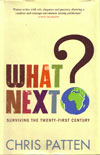 |
“What Next? —Surviving the 21st Century” (2008) [Allen Lane] |
| Chris Patten | |
| Very good analysis of the mess we are in. Historic perspective, which is necessary to understand the inertia we have to overcome in politics, religion, psychology, culture etc.
But it is uncertain where we should go: “So what is it — blind but blogging — that slouches onstage instead?” |
|
 |
Paola Pivi (2008) — “It just keeps getting better” |
| Kunsthalle Basel | |
| Remarkable. If you can get your hands on it. See PaolaPivi.com. 2008-09
(I may write something about a theory of art later) |
|
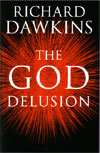 |
The God Delusion (2007) |
| Richard Dawkins | |
| Excellent set of arguments and a good analysis of the concept of God and religion. You should read it for all the arguments that you probably have not thought about. And see my point about intelligent design. 2007-12 | |
 |
Combattre le terrorisme islamiste (2007) |
| Mohammed Sifaoui | |
| Excellent analysis, pointing out a large number of dangerous misconceptions. Must-read to understand how we need to proceed globally. 2007-08 | |
 |
L’Intelligence Collective (1994) |
| Pierre Lévy | |
| Re-read in depth. Highly interesting view on what happens in cyberspace and why we are entering a new era. He divides history in the archaic era, the thermodynamic era (masses of people and objects) and the molecular era (individuals and technologies at the atomic level). Cyberspace will add a collective intelligence. Written before the ascent of the web, but an excellent prediction of what has happened since. 2007-08 | |
 |
Hitler (1973) |
| Joachim Fest | |
| Reads like a thriller. Gives an excellent insight into the warped perceptions of that age and those of our own. 2007-08 | |
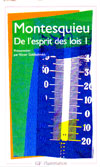 |
L’Esprit des Lois (several volumes) (1748) |
| Montesquieu | |
| Very interesting, reads like a blog, and was probably written like one. Must have been read by Adam Smith as it seems to me some ideas of “The Wealth of Nations“ come from these books. Was also inspiration for the constitution of the USA. 2007-02 | |
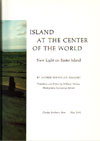 |
Island at the Center of the World — New light on Easter Island |
| Father Sebastian Englert | |
| Probably the most serious, sober and well-founded history of Easter Island, written by the missionary who lived there for 35 years. Englert gathered and checked every bit of info he could get. 2006-11 | |
| How Mumbo-Jumbo Conquered the World (2004) | |
| Francis Wheen | |
| Laborious reading at times, and I do not always appreciate the angle he takes. An interesting set of examples: faulty reasoning, denial of evidence, incoherence in thinking, hypocrisy, double standards and what not. A good reason for insisting on good education, critical approaches and ability to understand figures. 2006-10 | |
 |
General Guisan’s Zweifrontenkrieg (1962) |
| Jon Kimche | |
| An analysis of what happened in Switzerland during World War II, but it strangely does not reach any firm conclusion as to why the country was not invaded. 2006-06 | |
| Evolution and Ethics and other Essays (1893) | |
| Thomas Huxley | |
| This should be obligatory reading for creationists who believe that atheists have no reason to behave ethically. Very enlightening. Get it from Project Gutenberg. 2006-09 | |
 |
Biology (2003) |
| Miller & Levine | |
| You are right: I did not read this completely. But I did consult it to find out what it could possibly have been that the Creationists / Intelligent design people objected to. Goes with the next one. 2006-12 | |
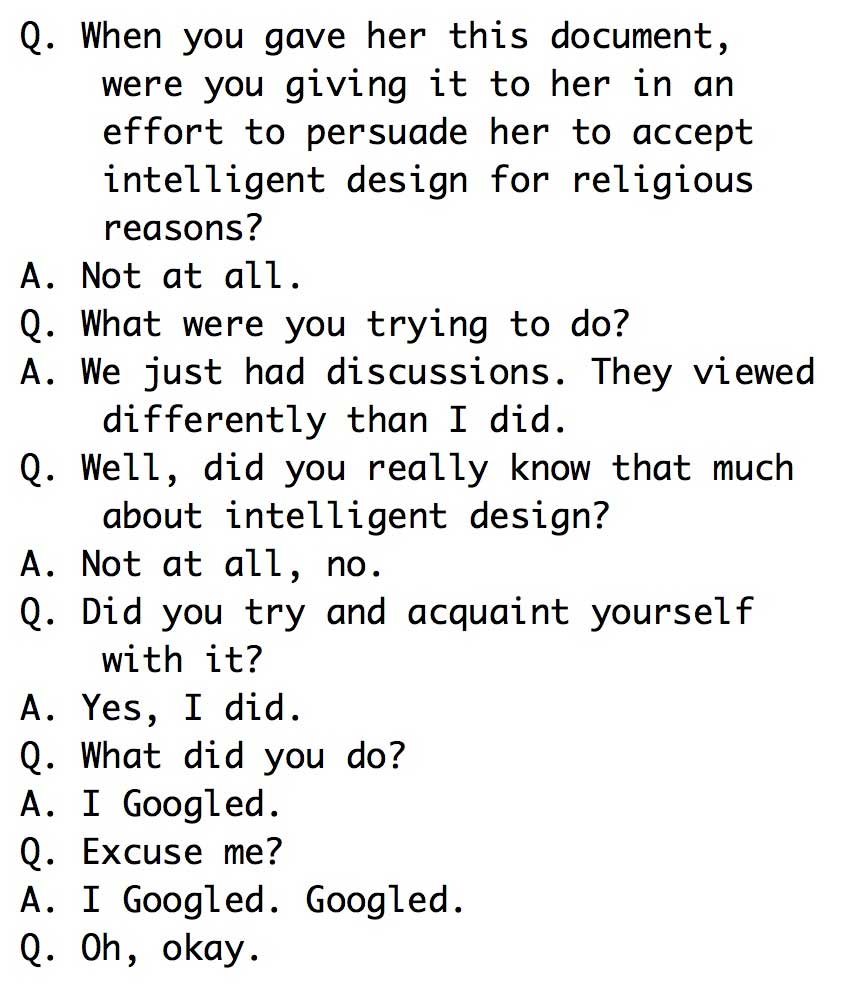 |
Transcript of the Trial “Kitzmiller v. Dover Area School District” |
| (courtroom transcript) | |
| Sounds as if it’s going to be boring, but in fact it was gripping. Here are these people who are convinced that they are good Christians, but they are lying, scheming and imposing their views on others while denying evidence. I think the judge was very lenient in his judgement. 2006-09
I had to paste together the text of many web pages to get the full transcript, so I post the full texts here again for others to use. I corrected a few spelling mistakes and typos. There are three plain text files: Plaintiffs (2.8MB) - Defense (2.2MB) - Judgement (200k) |
|
 |
The Seven Daughters of Eve |
| Brian Sykes | |
| Very well written account of what we know about human genealogy in Europe through the evolution of mitochondrial DNA. The only parts I did not like were the romanticised histories of the seven clan mothers who lived at least ten thousand years ago, although it is difficult to give a popularised idea of life in prehistoric times in another way. 2006-08 | |
| The Chrysalids | |
| John Wyndham | |
| This is a re-read. I read it first in 1969 as a science-fiction novel. But it is actually a warning of the disasters that can come from organized religion/ideologies. Classically clear English. 2006-08 | |
| Essais | |
| Michel de Montaigne | |
| This was brought to my attention by Pieter van Biervliet of the Normaalschool Torhout. Old French and very difficult, but worth trying. 2006-03 | |
 |
The Shia Revival |
| Vali Nasr | |
| Necessary insights into the internal problems of the muslim world. | |
 |
Éloge de la plante (In praise of Plants) |
| Francis Hallé | |
| Best book I ever read on botany. Hallé summarises brilliantly what we know today about plant life, and how different plants are from animals. He knows that most people take plants for granted and have more interest in animals. The first part of the book therefore treats all the main differences between animals and plants, starting from such simple aspects as symmetry, volume and surface. Many toungue-in-cheek jokes make it a very agreeable read. Interview with the author (English) Soundbites of interviews with Hallé (French) About his canopy raft (English) About his canopy raft (French) 2006-01 |
|
 |
The Prince |
| Nicolo Machiavelli | |
| Actually that was a re-read; I read it first about 30 years ago. Machiavelli writes all his important messages between the lines, and, I suspect, even “between the lines between the lines” if you see what I mean. This is a most anti-clerical, anti-monarchy book. Each of these opinions alone could cost you your head in the 1500s. But at no point can the reader find a single sentence that would prove than Machiavelli actually held them. The advice that returns most often is for the monarch to keep his subjects happy, so that he can rely on their support in adversity. Some knowledge of the history of Europe in the Renaissance is necessary. 2005-12 | |
| The Long Summer: how climate changed civilisation | |
| Brian Fagan
ISBN 1-86207-751-7 |
|
| Somewhat difficult to get into, but once you get going and make abstraction of repeated passages, it is a very good summary of how climatic changes destroyed civilisations or at least influenced them drastically. The influence of climate on the viability of a social structure is much greater than I presumed. 2005-06 | |
| Métaphysique des tubes | |
| Amélie Nothomb | |
| Autobiographical story about communication. Very well constructed and an agreable read. One thing though: as so many literary people, at one point she claims there is no thought possible without language. This is definitely not so. I consider it one of the problems of modern society that intellectuals restrict themselves to language. 2004-11 | |
| Draft Treaty establishing a Constitution for Europe | |
| http://european-convention. eu.int/ bienvenue.asp?lang=EN |
|
| Started reading. Funnily the link uses the word “convention”. The URL also has “.asp” in it: has the EU sold out to Microsoft for its websites? So far, I like its insistence on the rule of law, equal treatment of all persons etc. and especially the absence of any reference to a god. But it has too much economics built-in such as clauses about competition. 2004-04 |
|
 |
A History of Europe |
| Herbert Albert Laurens Fisher
(no longer in print) |
|
| Excellent history of Europe, which he says “is a continent of energetic mongrels”. Though written in 1936 and in certain aspects dated, this book is brilliant prose. 2004-04 | |
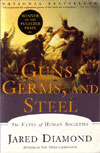 |
Guns, Germs and Steel (the fates of human societies) |
| Jared Diamond ISBN 0-393-31755-2 |
|
| Excellent explanation of the very-long view of the history of mankind. How the transition from hunting-gathering to agriculture was not an accident and why some communities were able to do it much earlier than others. 2004-02 | |
| Dude, where’s my Country? | |
| Michael Moore | |
| Even more worrying than “Stupid White Men”. In the meantime, we’ve had several enquiries started about the war in Iraq. 2004-01 | |
 |
Facts and Mysteries of Elementary Particle Physics |
| Martinus Veltman ISBN 981-238-149-X |
|
| Nobel Prize Physicist Martinus Veltman gives an impressive account of what we know about the deepest structures of Nature: the quarks, leptons, neutrinos and bosons that make up everything around us. He gives a very essential account of the important discoveries and the book contains over a hundred short “spotlights” on the people behind the discoveries. But this is not a history book: it is a short course in modern physics, that requires careful reading but can be understood completely by any curious but persevering person. Very satisfying read. I reviewed this book for the “CERN Courier”. 2003 | |
 |
Language in thougth and action |
| S.I. Hayakawa ISBN 0-04-400025-1 |
|
| Very interesting views on what happened to language in th 20th century. Two important points I remember: (1) poetry was hijacked by advertisement and (2) it is important to be able to travel up and down the ladder of abstraction. 1977 | |
 |
The Eagle’s Shadow |
| Mark Hertsgaard ISBN 0-7475-6395-0 |
|
| Makes almost identical points and comes to the same conclusions as “Stupid White Men”, but is much more reasoned and serious. Very well documented, with list of sources. 2003 |
|
 |
Stupid White Men |
| Michael Moore | |
| Sometimes funny, sometimes a bit vulgar, sometimes besides the point, but certainly a very outspoken and amazing tale of the state of the USA. Holds that George W. Bush did not really get elected president (probably true). Points out that there is no longer a significant difference between the Democrats and the Republicans: they both work in favour of business interests and the rich. This same point was already made decades ago by Kurt Vonnegut in an essay where he states that both parties are always winners and the public are the losers. Very well documented, with list of sources. 2003 |